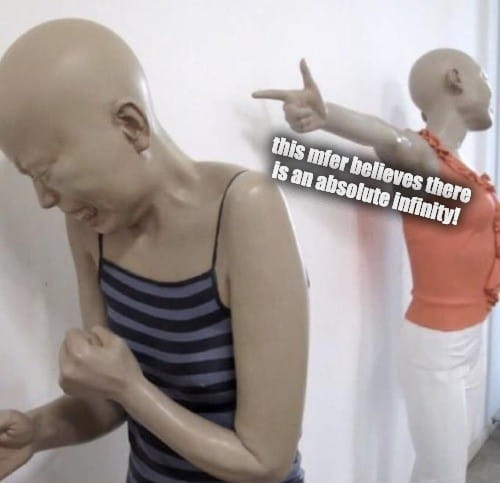this post was submitted on 30 Apr 2024
0 points (NaN% liked)
Science Memes
10322 readers
2291 users here now
Welcome to c/science_memes @ Mander.xyz!
A place for majestic STEMLORD peacocking, as well as memes about the realities of working in a lab.

Rules
- Don't throw mud. Behave like an intellectual and remember the human.
- Keep it rooted (on topic).
- No spam.
- Infographics welcome, get schooled.
Research Committee
Other Mander Communities
Science and Research
Biology and Life Sciences
- !abiogenesis@mander.xyz
- !animal-behavior@mander.xyz
- !anthropology@mander.xyz
- !arachnology@mander.xyz
- !balconygardening@slrpnk.net
- !biodiversity@mander.xyz
- !biology@mander.xyz
- !biophysics@mander.xyz
- !botany@mander.xyz
- !ecology@mander.xyz
- !entomology@mander.xyz
- !fermentation@mander.xyz
- !herpetology@mander.xyz
- !houseplants@mander.xyz
- !medicine@mander.xyz
- !microscopy@mander.xyz
- !mycology@mander.xyz
- !nudibranchs@mander.xyz
- !nutrition@mander.xyz
- !palaeoecology@mander.xyz
- !palaeontology@mander.xyz
- !photosynthesis@mander.xyz
- !plantid@mander.xyz
- !plants@mander.xyz
- !reptiles and amphibians@mander.xyz
Physical Sciences
- !astronomy@mander.xyz
- !chemistry@mander.xyz
- !earthscience@mander.xyz
- !geography@mander.xyz
- !geospatial@mander.xyz
- !nuclear@mander.xyz
- !physics@mander.xyz
- !quantum-computing@mander.xyz
- !spectroscopy@mander.xyz
Humanities and Social Sciences
Practical and Applied Sciences
- !exercise-and sports-science@mander.xyz
- !gardening@mander.xyz
- !self sufficiency@mander.xyz
- !soilscience@slrpnk.net
- !terrariums@mander.xyz
- !timelapse@mander.xyz
Memes
Miscellaneous
founded 2 years ago
MODERATORS
you are viewing a single comment's thread
view the rest of the comments
view the rest of the comments

Our mathematical definitions say that it does not end. We've defined addition so that any number + 1 is larger than that number (i.e. x+1 > x).
You're probably confused, because you think infinity is a concrete thing/number. It's not.
In actual higher-level maths, no one ever does calculations with infinity.
Rather, we say that if we insert an x into a formula, and then insert an x+1 instead, and then insert an x+2 instead, and were to continue that lots of times, how does the result change?
So, very simple example, this is our formula: 2*x
If we insert 1, the result is 2.
If we insert 2, the result is 4.
If we insert 82170394, the result is 164340788.
The concrete numbers don't matter, but we can say that as we increase x towards infinity, the result will also increase towards infinity.
(The result is not 2*infinity, that doesn't make sense.)
Knowing such trends for larger numbers is relevant for certain use-cases, especially when the formula isn't quite as trivial.
That is until you meet analysis people that define a symbol for infinity (and it's negation) and add it to the real numbers to close the set.
Also there are applications in computer science where ordering stuff after the first infinite ordinal is important and useful.
Yea unfortunately we do kinda calculate with infinity as a concrete thing sometimes in higher level maths...